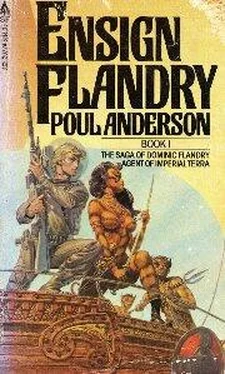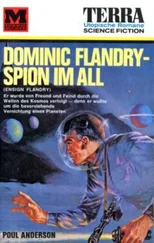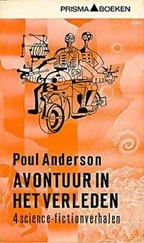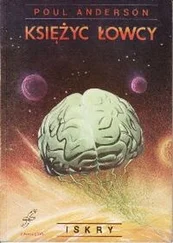Flandry’s hand shook. He drained his whisky at a gulp. It burned on the way down.
Abrams made a production of lighting a cigar. “All right, son,” he said. “Talk.”
“I’ve seen Hauksberg,” jerked from Flandry.
“Nu? Is he that hideous?”
“He … he … the bastard gets home free. Not a stain on his bloody damned escutcheon. He’ll probably pull a medal. And still he quacks about peace!”
“Whoa. He’s no villain. He merely suffers from a strong will to believe. Of course, his political career is bound up with the position he’s taken. He can’t afford to admit he was wrong. Not even to himself, I imagine. Wouldn’t be fair to destroy him, supposing we could. Nor expedient. Our side needs him.”
“Sir?”
“Think. Never mind what the public hears. Consider what they’ll hear on the Board. How they’ll regard him. How neatly he can be pressured if he should get a seat on it, which I hope he does. No blackmail, nothing so crude, especially when the truth can’t be told. But an eyebrow lifted at a strategic moment. A recollection, each time he opens his mouth, of what he nearly got us into last time around. Sure, he’ll be popular with the masses. He’ll have influence. So, fine. Better him than somebody else, with the same views, that hasn’t yet bungled. If you had any charity in you, young man—which no one does at your age—you’d feel sorry for Lord Hauksberg.”
“But … I … well—”
Abrams frowned into a cloud of smoke. “Also,” he said, “in the longer view, we need the pacifists as a counterweight to the armchair missileers. We can’t make peace, but we can’t make real war either. All we can do is hold the line. And man is not an especially patient animal by nature.”
“So the entire thing is for zero?” Flandry nigh screamed. “Only to keep what little we have?”
The grizzled head bent. “If the Lord God grants us that much,” Abrams said, “He is more merciful than He is just.”
“Starkad, though—Death, pain, ruin, and at last, the rotten status quo! What were we doing here?”
Abrams caught Flandry’s gaze and would not let go. “I’ll tell you,” he said. “We had to come. The fact that we did, however futile it looked, however distant and alien and no-business-of-ours these poor people seemed, gives me a little hope for my grandchildren. We were resisting the enemy, refusing to let any aggression whatsoever go unpunished, taking the chance he presented us to wear him down. And we were proving once more to him, to ourselves, to the universe, that we will not give up to him even the least of these. Oh, yes, we belonged here.”
Flandry swallowed and had no words.
“In this particular case,” Abrams went on, “because we came, we can save two whole thinking races and everything they might mean to the future. We’d no way of knowing that beforehand; but there we were when the time arrived. Suppose we hadn’t been? Suppose we’d said it didn’t matter what the enemy did in these marches. Would he have rescued the natives? I doubt it. Not unless there happened to be a political profit in it. He’s that kind of people.”
Abrams puffed harder. “You know,” he said, “ever since Akhnaton ruled in Egypt, probably since before then, a school of thought has held we ought to lay down our weapons and rely on love. That, if love doesn’t work, at least we’ll die guiltless. Usually even its opponents have said this is a noble idea. I say it stinks. I say it’s not just unrealistic, not just infantile, it’s evil. It denies we have any duty to act in this life. Because how can we, if we let go of our capability?
“No, son, we’re mortal—which is to say, we’re ignorant, stupid, and sinful—but those are only handicaps. Our pride is that nevertheless, now and then, we do our best. A few times we succeed. What more dare we ask for?”
Flandry remained silent.
Abrams chuckled and poured two fresh drinks. “End of lecture,” he said. “Let’s examine what’s waiting for you. I wouldn’t ordinarily say this to a fellow at your arrogant age, but since you need cheering up … well, I will say, once you hit your stride, Lord help the opposition!”
He talked for an hour longer. And Flandry left the office whistling.











